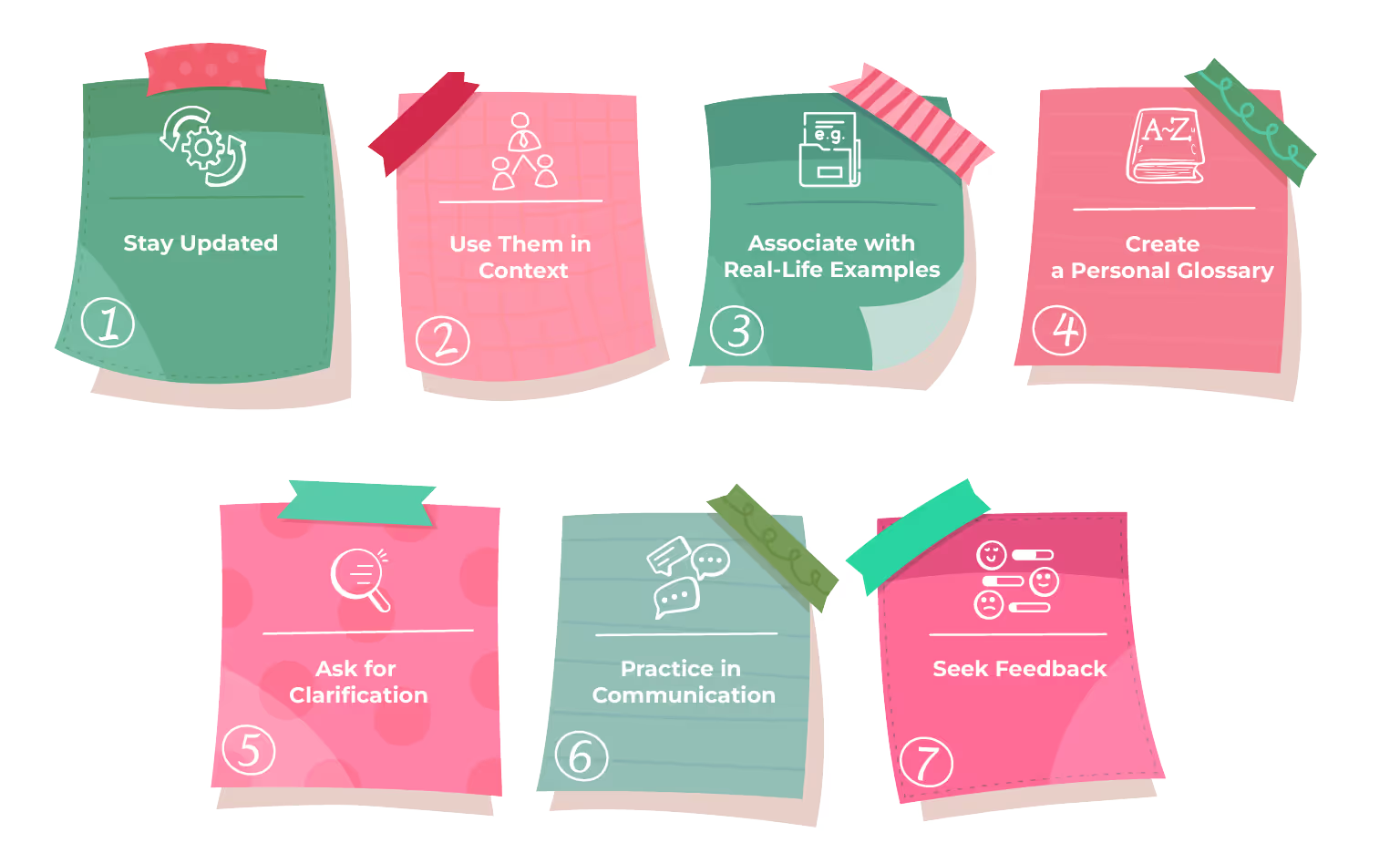
Blog
How to Master Sales Abbreviations: A Comprehensive Guide for Sales Professionals
November 21, 2023


Key Insights
There is no doubt that effective communication is the most expected skill of a sales professional.
The brevity with which they speak, the clarity they bring to their clients, and the curiosity and interest they imbibe in their prospects will define the possibility of the sale, making the utilization of sales abbreviations, or 'abbreviation for sales,' one of the most effective ways salesforce can tick all these checklists from their sales conversations.
How can a salesperson ensure brevity and clarity without making the audience feel bored with words?
The use of sales abbreviations is one of the most effective ways salesforce can tick all these checklists from their sales conversations.
In this blog, we will walk you through the effective utilization of sales abbreviation, when and where to use it, and tips to memorize and apply them judiciously.
So scroll down for more.
How to Utilize Sales Abbreviations Effectively
Effectively utilizing sales abbreviations can enhance communication efficiency and streamline your interactions in the sales environment.
Incorporating commonly used sales acronyms, such as CRM (Customer Relationship Management) and KPI (Key Performance Indicator), can significantly contribute to a more efficient and streamlined communication process.
Here are some strategies to help you make the most of sales abbreviations:

- Understand Your Audience
Though abbreviations can help you communicate crisply and effectively, there is a need to understand the level of understanding of the audience. Randomly throwing abbreviations at a listener who does not understand the terms you use can lead to the failure of the communication purpose and make the listener feel ignorant.
Hence, adjusting the usage of abbreviations according to the audience helps in ensuring effective communication and fulfilling the purpose intended.
- Contextual Application
The use of sales abbreviations in your regular conversation can make you sound cool. However, having a sales abbreviation list in your vocabulary is to ensure effectiveness. Its use therefore must be contextual and purposeful with the idea that it must bring clarity to the listener.
- Natural Incorporation
The use of abbreviations must come naturally in your communication, be it spoken or written. There should be a smooth flow of words that fit into the context of the conversation. Care must be taken not to overuse them which empty it of its purpose and creates confusion for people who are not familiar with all these terms.
- Educate and Communicate
It's not necessary that everyone on your team is aware of all the abbreviations that you use. Hence, ensure that they are educated in the common abbreviations that are used often in your field of conversion and explain their meaning if they seem to not know it in a way that does not belittle them.

- Evaluate Effectiveness
While using any tool or technique for enhanced effectiveness and optimization of your operations, its effectiveness must be evaluated. This ensures that the intended purpose is fulfilled and the expected results are derived. Especially while using sales abbreviation, it is important to ensure that it's not leaving the audience confused.
Additionally, when employing tools like a sales commission calculator, verifying its accuracy and alignment with your business goals is crucial for achieving optimal outcomes in sales performance.
By implementing these strategies, you can integrate sales abbreviations effectively into your communication style, fostering clear and efficient interactions within your sales team and with clients.
For further reading, check A Step-by-Step Guide to Achieving Sales Transformation Success.
When and Where to Use Sales Abbreviations
Using sales abbreviations does help in enhancing the effectiveness of your sales conversation. But knowing when and where to use them will help in achieving the purpose it was meant to fulfill.
For example, you can liberally use sales abbreviations during your internal meetings in this environment, both the speaker and audience are clear of how much they know of the terms used. In such a situation, it will help in effectively conveying the message in limited words.
While you throw such jargon to a person who might be outside your industry, it will only leave them confused with no clarity on the conveyed information. Especially during a sales pitch, it is ideal to use these abbreviations for sales in limited situations. This ensures that you give them clarity about the product you are talking about without leaving them confused about the abbreviation you just used.
Judicious use of sales abbreviations depends on the audience, context, and purpose of communication. Internally, abbreviations can enhance efficiency, but externally, especially when dealing with clients, clarity should take precedence.
Striking the right balance ensures that sales abbreviations, guided by a clear understanding of sales terminology, contribute positively to communication without hindering understanding or engagement.
Tips for Memorizing and Applying Sales Abbreviations
With a larger repertoire of jargon and terms that make up the sales abbreviations, it might become difficult to remember all of them and effectively use them in your communication in the business world.
To overcome this challenge, incorporating practical examples of sales incentives, such as bonuses, commissions, and recognition programs, can provide tangible illustrations that make the understanding and application of sales abbreviations more accessible and memorable.
So here are a few tips that will help you memorize and apply the abbreviation for sales and marketing purposes.

- Stay Updated
Business and sales jargon have limitless growth. They keep increasing in number as new ideas and words that define the ideas keep coming. So it's important to stay updated about the industry trends, market changes, and innovations in your field of expertise to keep learning and applying the latest words.
- Use Them in Context
Trying to infer the meaning of the sales abbreviations based on the context it was used will help understand it better. Further, using these abbreviations in your everyday business conversations and situations also helps reinforce them in your memory.
- Associate with Real-Life Examples
The easiest way to learn something new is by connecting it to our everyday reality and practices. Relating each abbreviation to specific products, processes, or situations and associating it with real-life examples can make them more memorable.
- Create a Personal Glossary
Preparing a personal sales abbreviation list also helps in memorizing these abbreviations for your everyday business conversation. Curating a personal glossary facilitates quick reference, reinforcing the terms in your memory and solidifying them as permanent.
- Ask for Clarification
They say the best way to learn is by asking questions. So, whenever you come across an abbreviation you don't understand, always ask the speaker for its full form and meaning. Clarifying your doubts helps in learning and memorizing easily.
- Practice in Communication
The best way to memorize and apply your sales abbreviation knowledge is by applying it in your everyday business conversations. Using it among people who understand its meaning, and imagining mock scenarios to apply the sales conversations helps in reinforcing it in your memory.
- Seek Feedback
Improving yourself must be a constant and consistent effort on your part. Asking for feedback from your peers and mentors on your use of abbreviations, the relevance of it in the context that you use, and the meaning it adds to your conversation helps in correcting your mistakes and understanding how it elevates your sales conversations.
Memorizing and mastering sales abbreviations will enhance your communication skills, streamline collaboration, and help navigate the sales landscape with confidence.
For more information, check out Sales Skills Every BDR Should Master.
Final Thought
Sales abbreviations can elevate your language, tone, and style. It makes the conversation sound professional and salesy. These are ways that you tap into the curiosity of your listeners and convert it into selling potential.
Additionally, incorporating a well-defined incentive structure, such as performance-based bonuses and commission tiers, can further motivate sales teams and enhance the overall effectiveness of your selling approach.
But care must be taken not to overdo it as well. As it can leave the audience confused and make them feel ignorant. The line between building curiosity and making them feel stupid is fine. Hence, serious care must be taken to ensure that sales abbreviations help you enhance your communication rather than ruin the whole experience.
It's all about hitting the right balance between sounding professional and tapping curiosity. As sales is a job that requires these kinds of skills to ensure lead generation, conversion, and closing of deals, the salesforce must work towards upskilling to enhance their communication.
For more sales-related reading, connect with Kennect. For more information, Book A Demo Now!
ReKennect : Stay ahead of the curve!
Subscribe to our bi-weekly newsletter packed with latest trends and insights on incentives.
Thank you! Your submission has been received!
Oops! Something went wrong while submitting the form.
Your data is in safe hands. Check out our Privacy policy for more info















